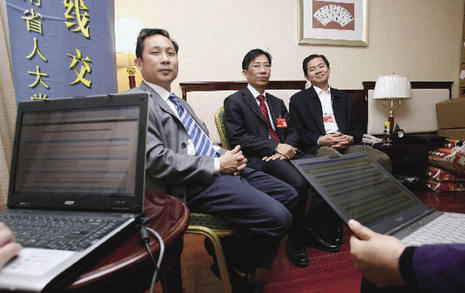| Citizens' Political Participation Inspired by the Internet
By staff reporter LI YAHONG
In general, I surf the Internet to get to know what issues netizens are concerned about, and their opinions and suggestions on the work of the Party and the government," said Chinese President Hu Jintao on June 20, 2008 during his online dialogue with the netizens of people.com.cn.
In China, following increases in the number of netizens, leaders are paying more and more attention to the Internet, a direct channel through which to contact the broad masses. Hu Qiheng, an academician of the Chinese Academy of Engineering and president of the Internet Society of China, said, "The Internet has promoted China's social progress. It provides a platform for the people to express their opinions, and a platform for political participation of the people."
 |
| Hainan deputies to the 2009 National People's Congress communicate with netizens via the Internet. |
New Democratic Channel
"Now we have the General Secretary as our cyber friend," said a netizen on the BBS. In a 20-minute online dialogue between the General Secretary and netizens Hu Jintao answered questions extemporarily.
By the end of 2008, China had a total of 298 million netizens, surpassing the United States and making it the world's biggest net-using nation. Hu Jintao said, "The Internet has become a collecting and distribution center of ideological and cultural information, and a magnifier of public opinion. We should fully understand the social influence of the emerging media represented by the Internet."
On February 13, before the annual NPC and CPPCC sessions, Xinhuanet.com opened a column entitled "Premier, Please Listen to Me." The lead of the column reads, "Whatever you want to say to our Premier, and anything you are concerned about and want our Premier to know, you may express here." One of the main tasks of the annual NPC is to make laws.
At a press conference at the 2005 NPC and CPPCC sessions Premier Wen Jiabao said, "I have browsed the pages of Xinhuanet.com. The netizens raised several hundred questions for me to answer. Their suggestions and opinions are worthwhile for me and our government to consider earnestly." In Luoyang City, Henan Province, four netizens have been recommended as deputies to the local people's congress and members of the local committee of the CPPCC.
The attention paid to netizens by General Secretary Hu Jintao and Premier Wen Jiabao is an "active practice of democratic politics." According to a survey, 71.9 percent of respondents hold that the Internet will become a new channel through which to build Chinese-style democracy. Wang Yang, secretary of the Guangdong provincial committee of the Chinese Communist Party, who is open-minded about the Internet, is called a "pioneer of China's online democratic politics." Wang Yang once invited netizens to a meeting to listen to their opinions. He said, "What a leader worries about most is failing to listen to real conditions." A survey on the source of leaders' information conducted by the Chinese Academy of Social Sciences shows that 50 percent of leaders hold that the Internet is the most important channel of information.
| 